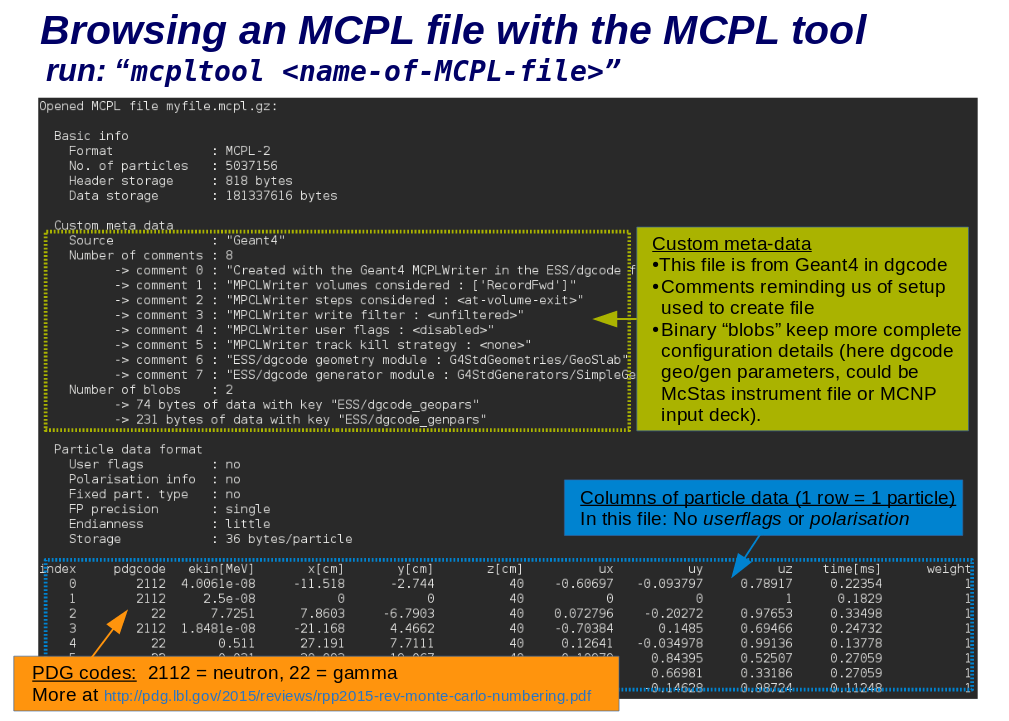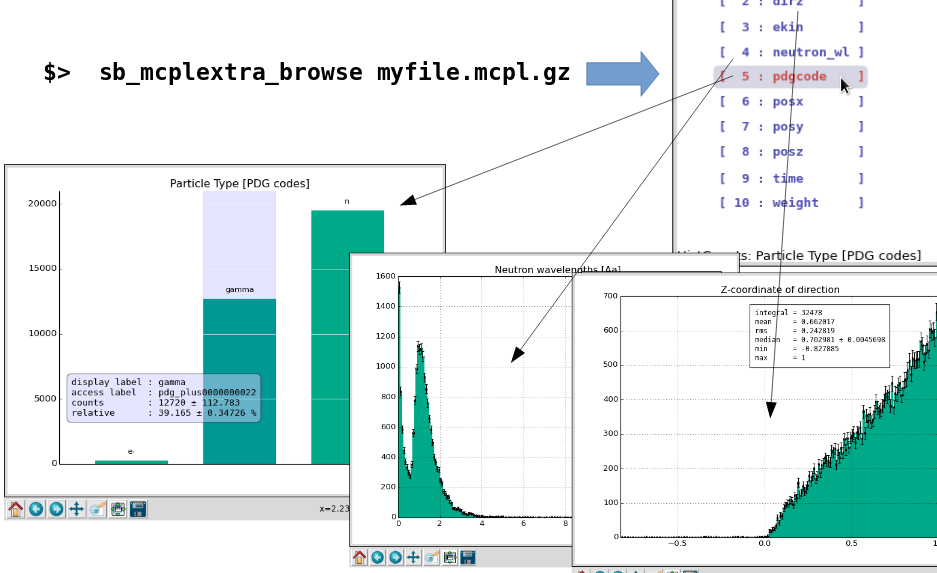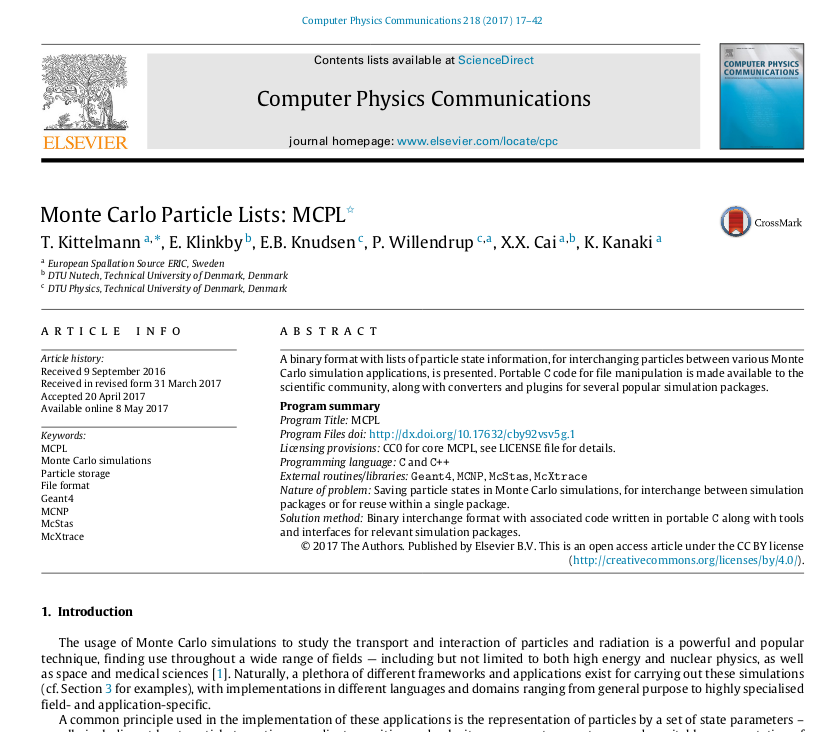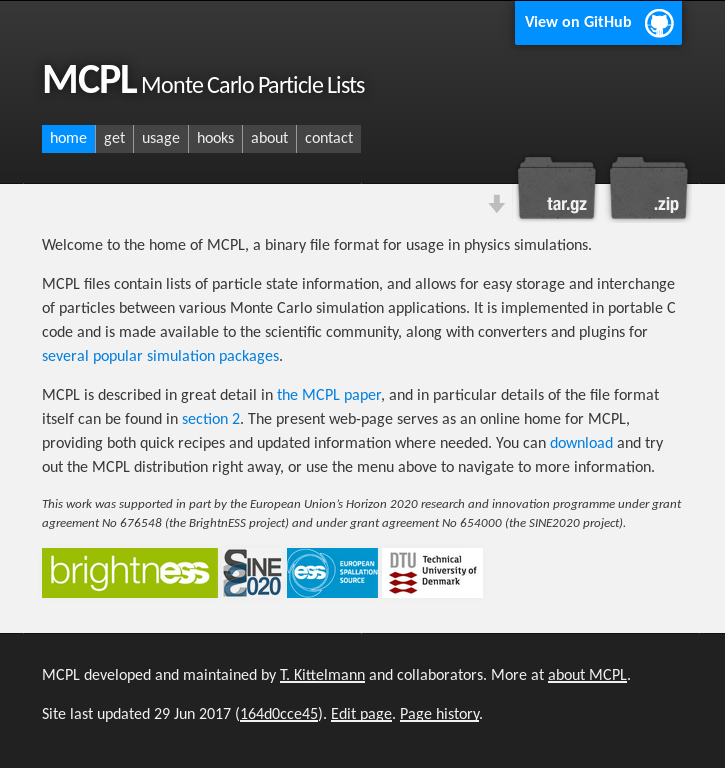MCPL
MCPL (Monte Carlo Particle Lists) files contain lists of particle state information, and allows for easy storage and interchange of particles between various Monte Carlo simulation applications like Geant4, McStas, MCNP, etc. It is described in great detail in a published paper and recipes for how to use it with other programmes can be found on the MCPL website. Rather than being comprehensive, the present page will focus on MCPL tools and recipes that are most likely to be of interest for users of dgcode. There is also some information in the MCPL talk given at the DG jamboree September 2016. Since the paper and that talk, the number of applications supporting MCPL has only continued to grow, but the basic concepts are still relevant.
Inspecting MCPL files
Run
mcpltool myfile.mcpl.gzto print contents of files, including both file-level meta-data and the particle data itself. It can also be used to merge or repair files, or perform simple data extraction. Runmcpltool --helpfor more instructions.
Use
pymcpltool --stats myfile.mcpl.gzto get printed a quick summary of the particle contents of a file.Use
sb_mcplextra_browse myfile.mcpl.gzto view a standard set of histograms of the content of the file (using the SimpleHists browser).
You can also add a filter expression (see below) and only get certain particles collected in your histograms. Example:
sb_mcplextra_browse myfile.mcpl.gz where "is_neutron && ekin>1keV". Runsb_mcplextra_browse --helpfor more instructions.If you need to, you can create custom C/C++ or Python code which opens an MCPL file and loops over the particles inside. You can find examples at the MCPL website here and here. In order to use MCPL inside dgcode, you should add
USEEXT MCPLto your package dependencies in yourpkg.infofile.
MCPL files as simulation input
As documented here, MCPL files are easily used as input to your Geant4 simulation by using the G4MCPLPlugins.MCPLGen module in your sim script:
import G4MCPLPlugins.MCPLGen as Gen
gen = Gen.create()
gen.input_file = "mydata.mcpl.gz"
See the dedicated documentation for more options.
MCPL files as simulation output
Normally this requires no code changes. Simply use the --mcpl flag to your
sim script to capture all particles entering volumes with a
certain name and write them into a newly created MCPL file. So if you have a
volume called "FwdDet" and you wish to capture all particles reaching it
into a newly created MCPL file, simply run your sim script
like (assuming your package name is TriCorder):
$> sb_tricorder_sim [other options] --mcpl=FwdDet
A more advanced example, capturing any high energy gamma entering any volume
called either "Detector" or "Sample" (see more about filter
expressions further down on this page):
$> sb_mystuff_sim [other options] --mcpl="Detector,Sample where trk.pdgcode==22 and step.pre.ekin > 1MeV"
There are many other configuration possibilities, including attaching custom
per-particle info to the stored particles (MCPL “user flags”). Run with the flag
--mcpl=help for complete instructions:
$> sb_tricorder_sim --mcpl=help
Capture and write simulated particles to standardised MCPL files
by supplying one or more flags according to the following syntax
(note the usage of quotation marks)
--mcpl="KEYWORDS [where CONDITION] [to FILENAME] [withflags FLAGS]"
KEYWORDS is a comma separated list containing both names of the
Geant4 volume in which G4Step's of particles will be considered
by the MCPLWriter instance being configured, and/or the follow-
ing list of special keywords:
on_vol_entry : Only treat G4Step's at volume entry [default]
on_vol_exit : Instead treat G4Step's at volume exit
kill_always : Tracks always killed upon treatment [default]
kill_never : Tracks never killed
kill_filtered : Tracks killed only if filter passed
all_vols : Consider all volumes in active geometry
opt_dp : Store double-precision numbers in output.
opt_pol : Store polarisation info in output.
opt_userflags : Store special user flags in output.
grabsrc : Short-cut to grab just particles from the particle
generator. Implies kill_never and all_vols plus
prepends "trk.is_primary && step.stepnbr==1" to
CONDITION
CONDITION is an optional filter expression based on the G4ExprParser.
FILENAME is the name of the output file (defaults to "particles" if
not provided).
FLAGS is an expression generating a value for the 32bit integer user
flag field in the output file.
Examples:
1) Capture (and halt further simulation of) any particle entering
volumes named "Target" to a file named "particles.mcpl.gz":
--mcpl=Target
2) Capture generated neutrons to srcneutrons.mcpl.gz:
--mcpl="grabsrc where trk.is_neutron to srcneutrons.mcpl.gz"
3) Capture high energy gammas entering volumes named "Detector"
or "Sample":
--mcpl="Detector,Sample where trk.pdgcode==22 and step.pre.ekin > 1MeV"
4) Capture any particle leaving the "World" volume with double-
precision storage:
--mcpl="World,opt_dp,on_vol_exit"
5) Capture any particle entering volumes named "Detector" and embed copy
number information about the Detector volume and it's mother volume
into the user flag field of the mcpl file:
--mcpl="World withflags step.volcopyno+1000*step.volcopyno_1"
Finally, it is of course also possible to configure MCPL writing using Python code inside your sim script, rather than using command-line options, by using the G4MCPLPlugins.MCPLWriter module. See an example here for how to use it.
Modify MCPL files
The sb_mcplextra_filterfile command can be used to produce a new MCPL file
from an existing one, containing only a subset of the original particles. The following
example shows how to extract just neutrons with long wavelength (see below for more info on the filter expressions used here):
sb_mcplextra_filterfile infile.mcpl outfile.mcpl "is_neutron && neutron_wl > 0.5Aa"
And here is an example extracting all particles starting within \(1\mathrm{cm}\) of the \(Z\)-axis:
sb_mcplextra_filterfile infile.mcpl outfile.mcpl "sqrt(x^2+y^2)<1cm"
Or, getting the first 1000 particles from a file (perhaps to get a smaller representative file which can be more easily shared for debugging purposes):
sb_mcplextra_filterfile infile.mcpl outfile.mcpl -l1000
Run sb_mcplextra_filterfile --help for full usage instructions. Note that
there also exists a sb_mcplextra_filterview command, which merely prints the
selected particles, rather than producing a new file.
Filter expressions
Several of the commands or Python modules above accept flexible filter expressions. This functionality is implemented via the custom ExprParser package inside dgcode, and which variables one can use depends on the context.
Always available:
Mathematical functions (
sin,exp,acos, etc.). See full list in ASTStdMath.cc (look in thecreate_std_math_functionfunction).Physics units (
mm,cm,keV,MeV, etc.). See the full list in Units/libinc/Units.hh or the equivalent Python file.Mathematical and physics constants (
pi,c_light,h_Planck, etc.). Again, see the full list in Units/libinc/Units.hh or the equivalent Python file.
Available when filtering based on content of MCPL files (i.e. when using MCPL file as input):
Position:
x,y,z(aliases:posx,posy,posz)Direction:
ux,uy,uz(aliases:dirx,diry,dirz)Particle type, as PDG code (2112=neutron, 22=gamma, etc.):
pdgcodeFor convenience, the following derived boolean variables are provided:
is_neutron,is_gamma(aliasis_photon),is_neutrino,is_ion
Kinetic energy:
ekinFor convenience, the following derived variable is provided for neutrons, to make it easy to filter on the wavelength:
neutron_wl. Note that this variable is only defined for neutrons, so it should be protected in expressions withis_neutron, i.e."is_neutron && neutron_wl>1Aa”.
Polarisation:
polx,poly,polzTime stamp:
timeWeight/intensity:
weightMCPL userflag value, as integer:
userflag
Available when filtering on Geant4 simulations in progress (i.e. when writing MCPL files from Geant4 simulations):
G4Track-level parameters (refer to Geant4 documentation for details):
trk.trkid,trk.parentid,trk.is_primary,trk.is_secondary,trk.creatorprocess,trk.weight,trk.mass,trk.width,trk.charge,trk.lifetime,trk.name,trk.type,trk.subtype,trk.atomicnumber,trk.atomicmass,trk.magneticmoment,trk.spin,trk.is_stable,trk.is_shortlived,trk.pdgcode,trk.is_neutron,trk.is_neutrino,trk.is_opticalphoton,trk.is_photon(optical or standard photon),trk.is_gamma(same astrk.is_photon),trk.is_ionandtrk.mcplflag(the MCPL userflag from the input file, in case the G4 event is generated from an MCPL file).G4Step-level parameters (again, refer to Geant4 documentation for details):
step.edep,step.edep_nonion,step.edep_ion,step.delta_e,step.delta_mom,step.delta_pos,step.delta_time,step.steplength,step.stepnbr,step.volname,step.volname_1(name of mother volume),step.volname_2(name of grandmother volume),step.volcopyno,step.volcopyno_1(copy number of mother volume),step.volcopyno_2(copy number of grandmother volume),step.mat_name,step.mat_state,step.mat_density,step.mat_temperature,step.mat_pressure,step.process_defined_step.G4StepPoint-level parameters (again, refer to Geant4 documentation for details). Must be accessed either as post-step or pre-step, i.e.
step.pre.timeorstep.post.time. Here they are just listed in thestep.pre.xxxform:step.pre.stepstatus,step.pre.time,step.pre.globaltime,step.pre.localtime,step.pre.propertime,step.pre.mat_name,step.pre.mat_state,step.pre.mat_density,step.pre.mat_temperature,step.pre.mat_pressure,step.pre.ekin,step.pre.neutron_wl,step.pre.etot,step.pre.velocity,step.pre.beta,step.pre.gamma,step.pre.at_voledge,step.pre.x,step.pre.y,step.pre.z,step.pre.px,step.pre.py,step.pre.pz,step.pre.polx,step.pre.poly,step.pre.polz,step.pre.mom,step.pre.mom2,step.pre.weight,step.pre.process_defined_step,step.pre.volname,step.pre.volname_1,step.pre.volname_2,step.pre.volcopyno,step.pre.volcopyno_1,step.pre.volcopyno_2,step.pre.local_x,step.pre.local_y,step.pre.local_zandstep.pre.exists(boolean flag, false if the step-point info is not available - i.e. ifstep.post.existsis false, one should not access otherstep.post.xxxvariables - this is usually only a concern for the post-step, not the pre-step).

